What are the best skills to include in a resume?
Gone are the days when you could simply place “Microsoft Word” or “Data Management” in the skills and work experience sections of your resume.
Now, you have to be more creative and show what you can do with concrete examples of skills on your resume – whether it’s a hard skill or soft skill.
Unsure about which skills to include? Here are the 12 best resume skills that help you stand out as a stellar applicant:
- Communication skills
- Leadership skills
- Project management skills
- Attention to detail skills
- Time management skills
- Self-motivation skills
- Organizational skills
- Problem-solving skills
- Teamwork skills
- Research skills
- Customer service skills
- Technology skills
Whether you’re an entry-level candidate or an experienced professional, check out each one of these resume skills below with examples to grab the attention of your future employer. We also categorize by skill type and share how to present them on your resume!
12 Soft & Hard Skills for Resume
Before listing skills on your resume, it’s important to note the differences between soft skills and hard skills (and what they mean).
- Soft skills (e.g. leadership abilities and attention to detail) are more interpersonal and can be a great fit for any type of job. These skills tell an employer how well you work alone or with other people.
- Hard skills (e.g. Photoshop and Salesforce) are technical, measurable skills. These relate more to a specific job title.
You need a good mix of both soft and hard skills to demonstrate to employers that you work well with others, but can also complete specific tasks or expertly navigate certain programs.
Here are the twelve soft and hard skills to list on your resume:
1. Communication Skills
Type: Soft/hard skill
Companies want employees who can effectively communicate with internal and external stakeholders. Here are a few examples of desired communication skills:
- Actively listening.
- Giving constructive feedback.
- Developing rapport with co-workers.
- Presenting a report to clients.
On top of verbal and non-verbal communication, written communication is high on the list for employers.
In fact, according to the National Association of Colleges and Employers (NACE), 82% of employers desire candidates with strong written communication skills.
In addition to listing “Communication Skills“ on your resume, you should also provide examples of your communication skills in practice under tasks bullet points.
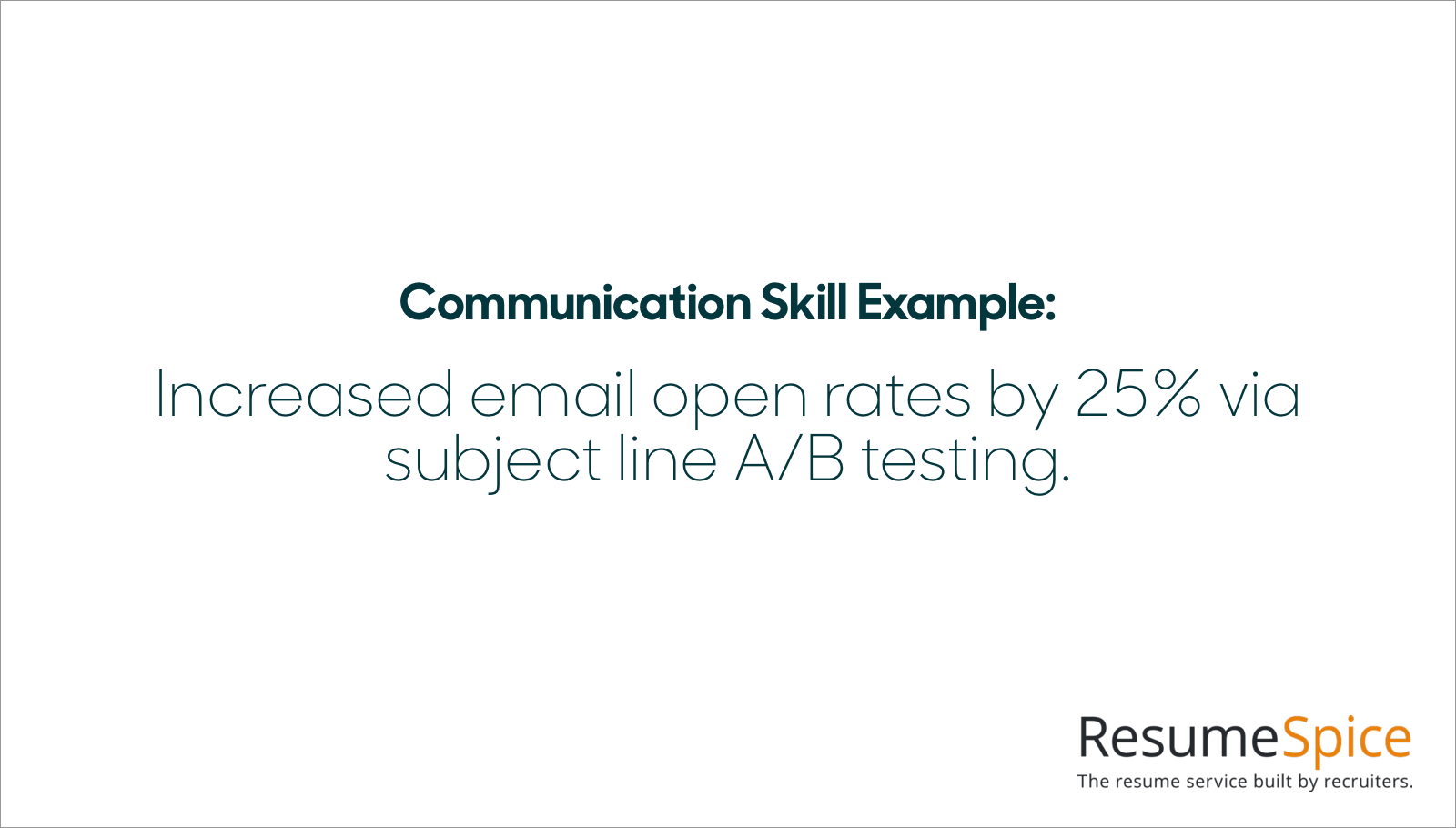
Use numbers and quantify your communication skills as much as possible such as listing your average campaign email click-through rate or how much you reduced employee turnover rate through engagement initiatives.
Related: “Why Should We Hire You?” Tips to Deliver the Best Response
2. Leadership Skills
Type: Soft skill
Leadership skills are one of the top skills desired by employers (67% of employers list leadership as a top attribute of candidates).
Here are a few examples of what employers look for:
- Resolving conflicts.
- Delegating tasks to the right team members.
- Aligning team members to achieve goals.
In short, demonstrate how you led a project, team, or initiative within your last position. Give real-life instances to back up your claims.
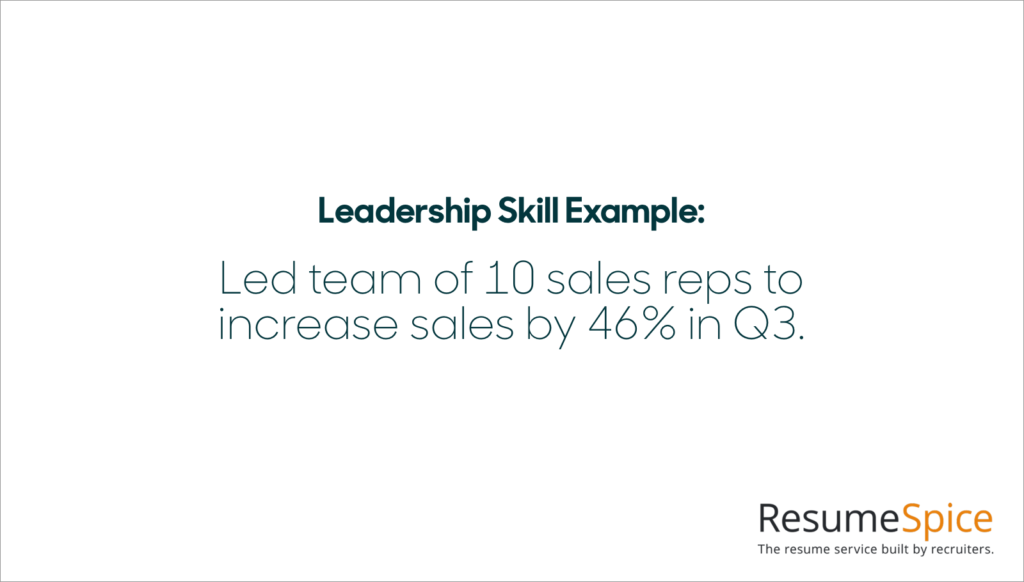
Prove that you can lead and motivate others to help hit company goals.
3. Project Management Skills
Type: Soft/Hard skill
While you might actually be applying for a project manager role, employers for any position want to see that you can manage a variety of projects. Project management skills include:
- Leading projects through project management software.
- Prioritizing the right tasks.
- Managing your time to meet deadlines.
Communicate how you managed a project such as through strategy creation, meetings, reporting, etc., and the final results. To make this more of a hard skill, list your expertise with project management software like Basecamp.
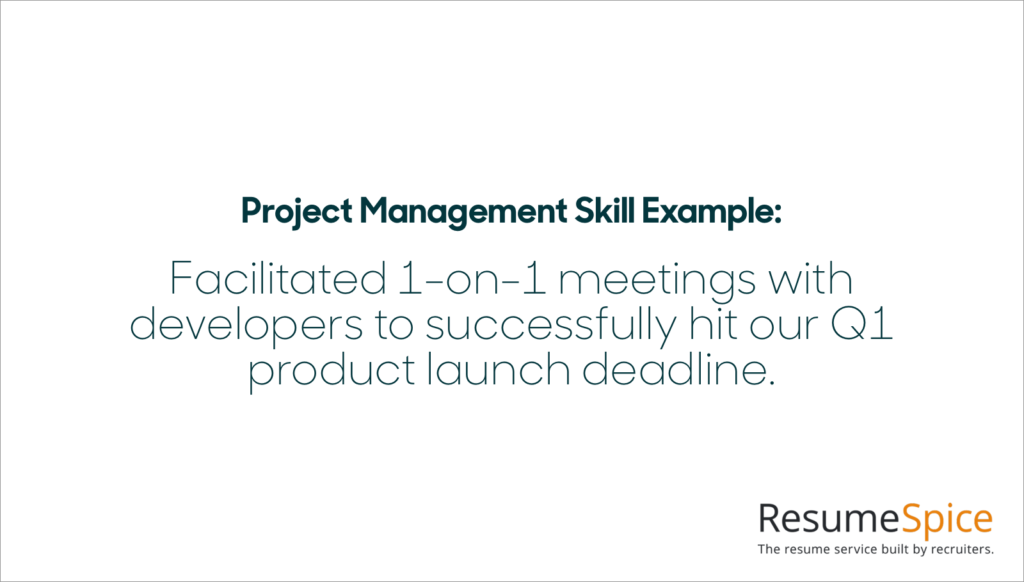
4. Attention to Detail Skills
Type: Soft skill
Details can make or break a company. Show that you’re detail-oriented and can be counted on to accurately complete tasks. Examples include:
- Editing and proofreading documents.
- Processing reports and company-wide emails.
- Following workflow procedures.
While you don’t necessarily have to include this skill under the “Skills” section of your resume, you can include under the “Work Experience” section as an example:
And don’t forget to proofread your resume to give this skill credibility. Hint: A professional resume service helps ensure that there are no mistakes on your resume.
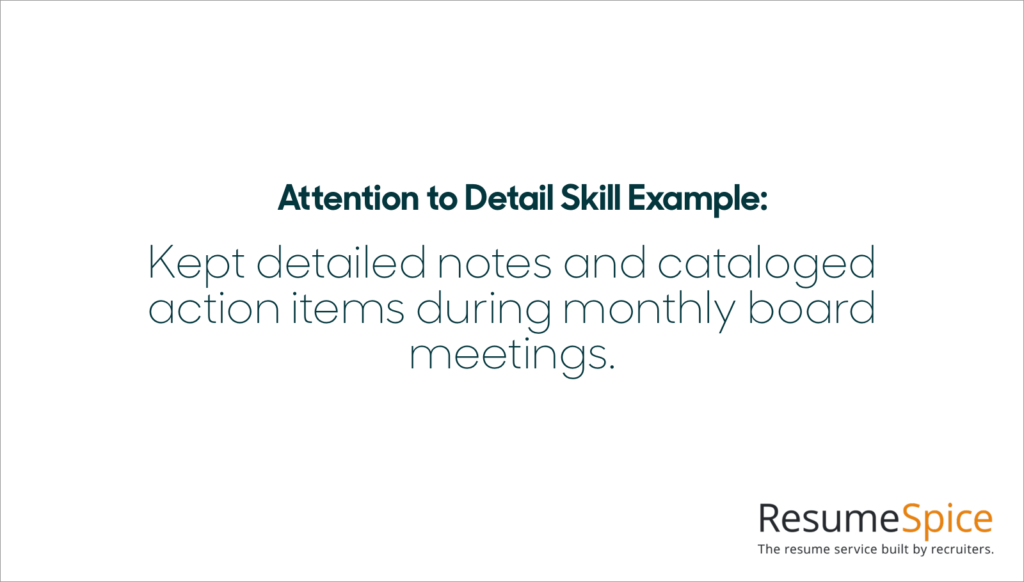
Related: We Analyzed 100 Resumes. Here Are The 6 Common Resume Mistakes We Found.
5. Time Management Skills
Type: Soft skill
Time management skills prove to employers that you’re able to prioritize tasks, spend company time wisely, and meet deadlines. Skills include:
- Making time-sensitive decisions.
- Multi-tasking different projects.
- Managing appointments and deadlines.
Also known as a “transferable skill,” time management shows that you can ultimately be counted on to meet both departmental and company goals.
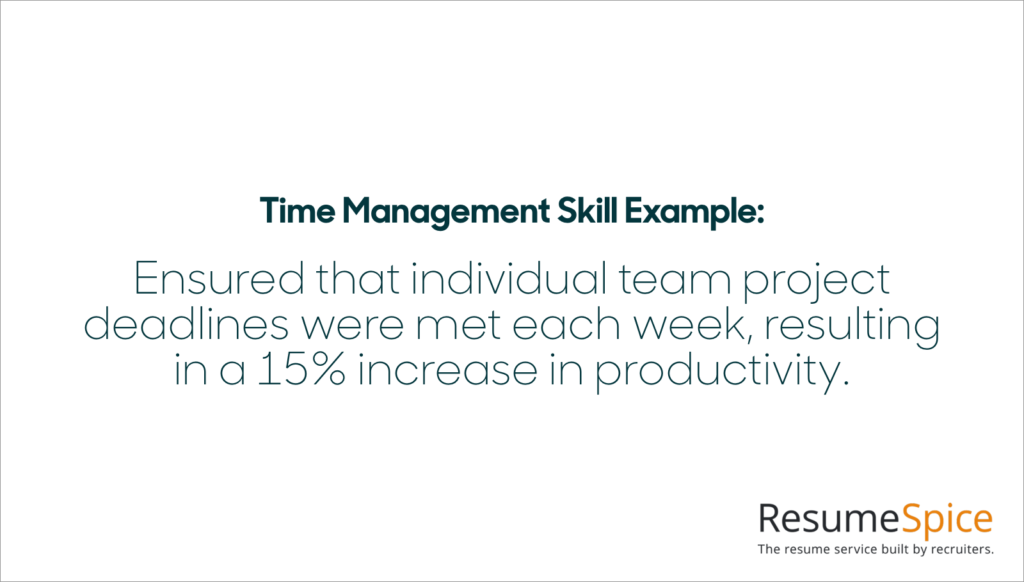
6. Self-Motivation Skills
Type: Soft skill
Especially as more jobs become remote, employers want to see that candidates can take initiative and don’t require constant reminding to complete tasks. Think of skills such as
- Leading a project without being asked.
- Asking questions to get clarification.
- Completing an online course to improve your skills.
Here’s an example of a way to quantify your self-motivation skills:
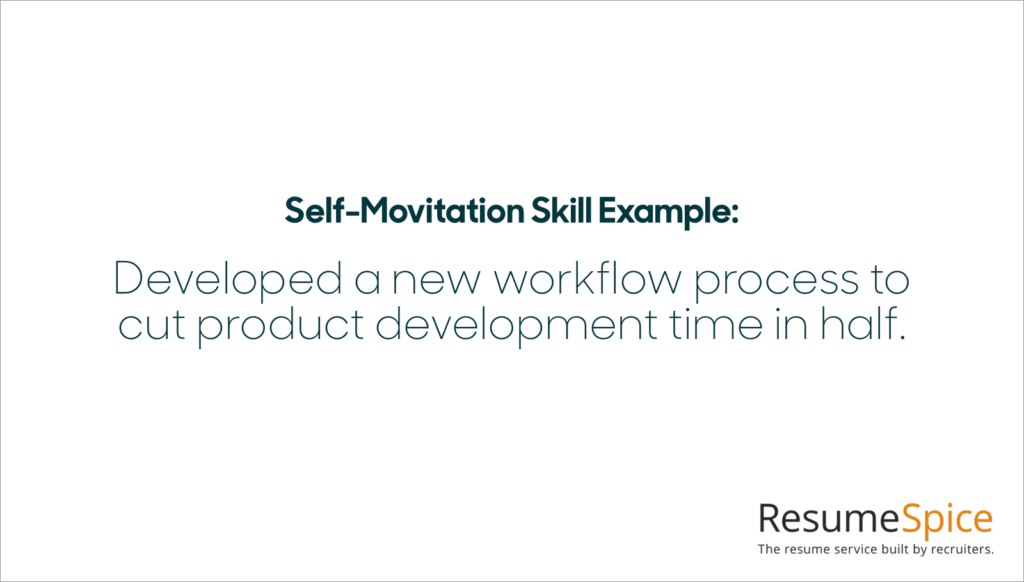
7. Organizational Skills
Type: Soft skill
A component of time management, organizational skills demonstrate that you can successfully focus on the job and efficiently handle the tasks required. Examples include:
- Planning company projects.
- Using digital organization tools.
- Managing team schedules.
As you can see, organizational skills aren’t just limited to physically organizing files or online documents. Other types of organization skills include teamwork (e.g. collaboration) and planning (e.g. decision making).
Check out this skill in practice:
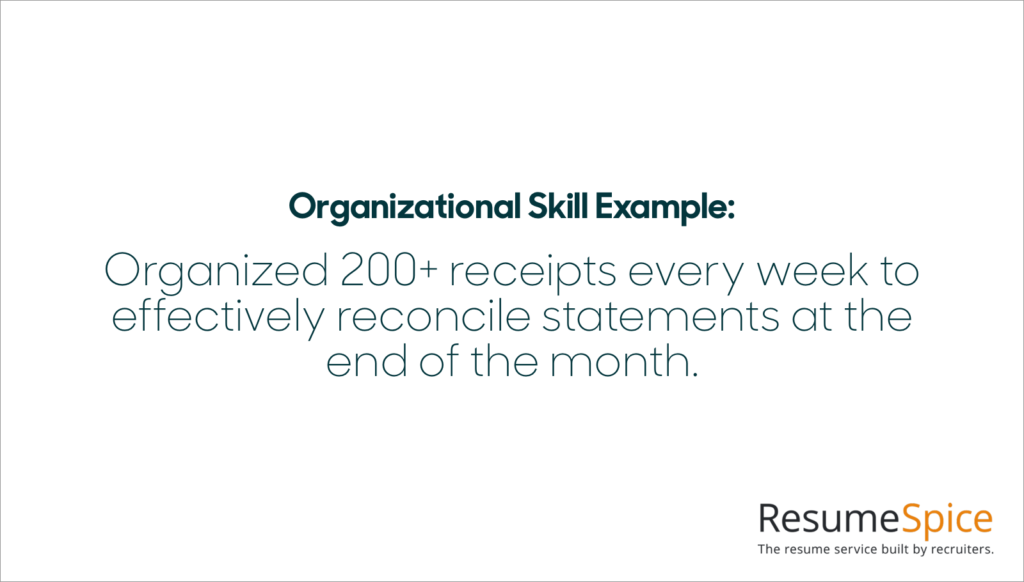
8. Problem-Solving Skills
Type: Soft skill
Any company position comes with its own unique set of challenges and problems. Show potential employers that you can think outside the box to resolve conflict or handle difficult situations:
- Researching to understand an issue.
- Analyzing different solutions.
- Clearly communicating solutions.
Here’s an example of how to effectively communicate your problem-solving skills:
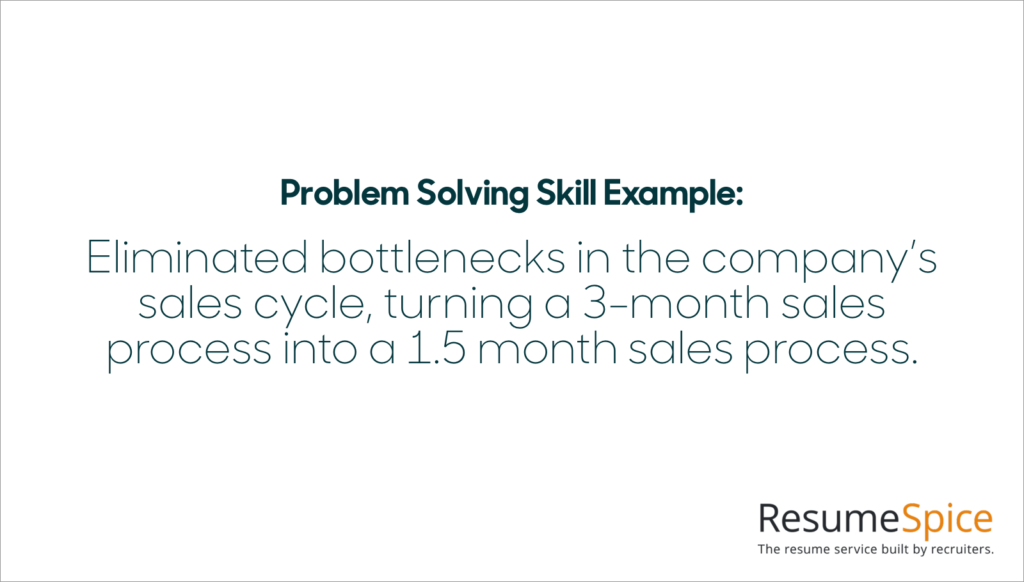
NACE found that 80% of employers want candidates with problem-solving skills. Make yours stand out with practical examples.
9. Teamwork Skills
Type: Soft skill
Especially as teams become more diverse, almost 79% of employers want candidates who can thrive in a team environment.
Demonstrate that you work well with others by highlighting how you’ve collaborated or worked with team members in the past:
- Listening to coworkers.
- Having a positive attitude.
- Giving constructive feedback.
This skill doesn’t need to go on the “Skills” section of your resume, but do list in job achievements. And, as always, give actual examples of how you’ve successfully been a part of a team:
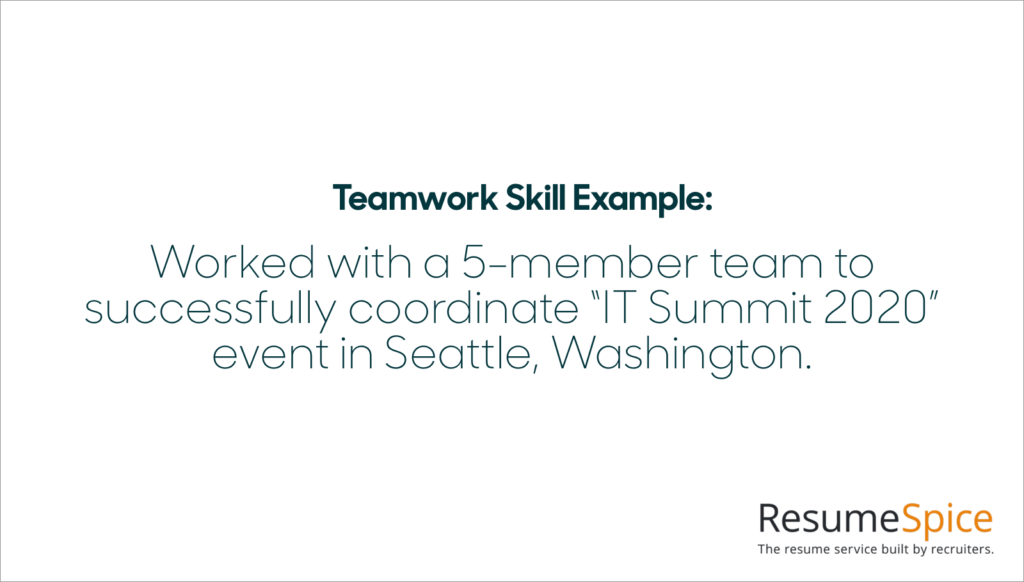
10. Research Skills
Type: Hard skill
Research skills on your resume highlight investigative and critical thinking abilities.
Employers want to see that you can a) independently find answers to certain questions and b) can use research tools to find qualified answers. Examples include:
- Collecting data.
- Using digital research tools like Todoist.
- Communicating research findings in programs like Excel.
Research skills are especially important for analyst, marketing, design, product development, and finance positions.

11. Customer Service Skills
Type: Soft skill
Customers are the lifeblood of any company. Even if you’re not specifically applying for a customer service position, show employers that you have the ability to engage and retain customers:
- Having patience with customer questions.
- Finding solutions for customer problems.
- Following through on customer requests.
33% of Americans say they’ll likely switch companies after one poor customer service interaction. Communicate with employers how your skills will help keep customers happy.
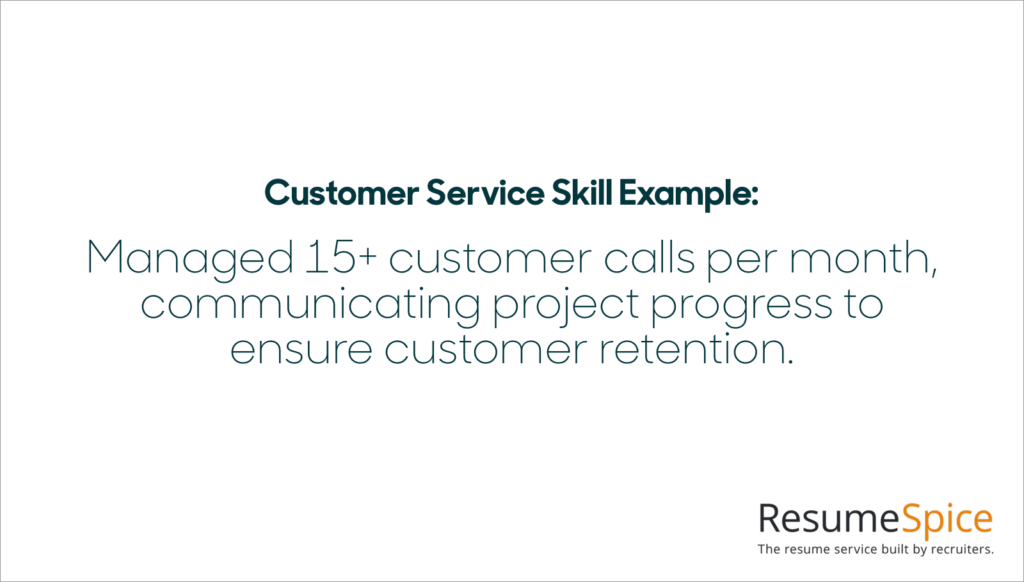
12. Technology Skills
Type: Hard skill
Highlight your competency with technology – from programming skills like HTML and C# to productivity tools such as Trello or Asana:
- Using spreadsheets to organize data.
- Managing company analytics.
- Generating reports from digital tools.
59% of employers want candidates with technical skills. And almost 55% of employers desire candidates with computer skills.
Whatever position you’re applying for, highlight your relevant experience with technology. Here’s an example of what this might look like for a content marketing manager position:
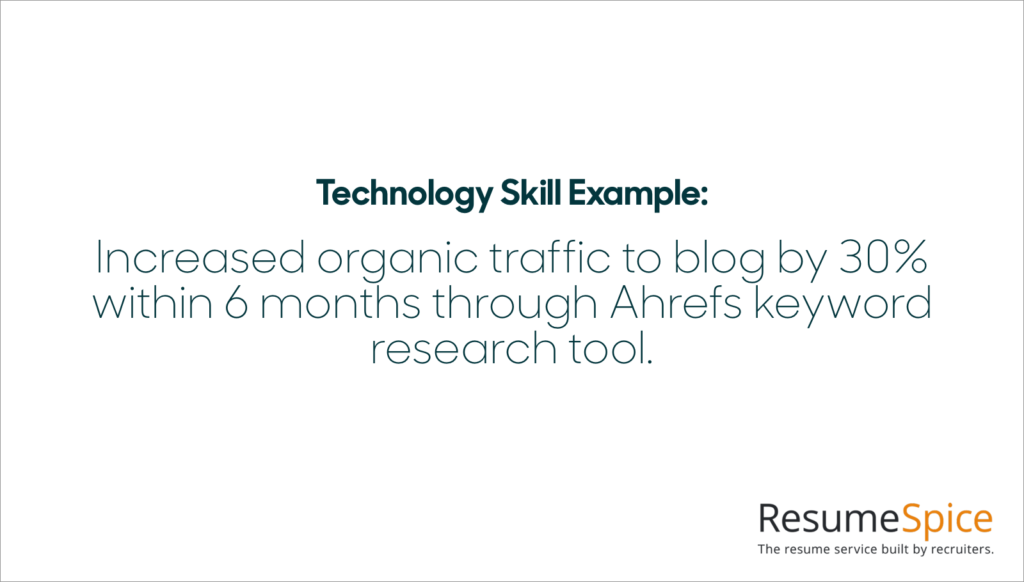
Related: 25 Best Online Learning Resources for Skill Development
How to format resume skills (including for ATS)
Now that you know what resume skills to include, let’s go over how to properly format these skills on your resume to pass inspection of the hiring manager and an Applicant Tracking System.
Here’s where to include your skills on your resume:
CORE COMPETENCIES / SKILLS SECTION
Place the “Skills” or “Core Competencies” section right after your contact info and career summary. In this section, include overall skills related to the job like “Customer Relations” and “Business Development.”
Separate your skills by bullets to optimize the space on your resume and create a visually pleasing + ATS friendly format.
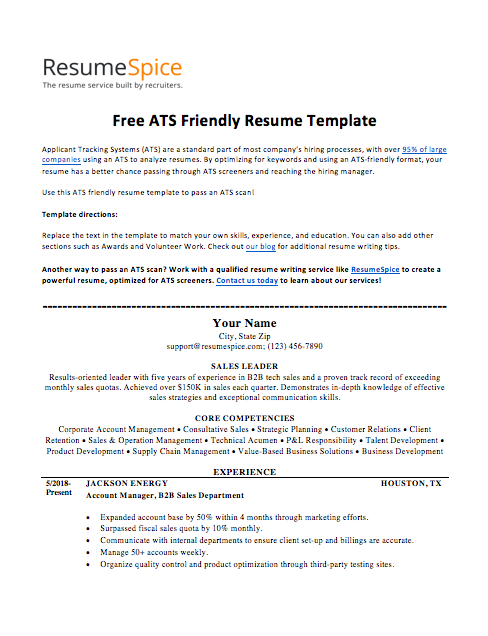
If you’d rather not start from scratch, download our free ATS-friendly resume template here.
EXPERIENCE SECTION
Don’t stop there with listing your skills. Within your “Experience” section on your resume (following “Core Competencies”), use bullets to show your skills in action.
For example, maybe you used your expert organization skills to succeed at your last job. Tell your potential employer and provide quantifiable examples: “Managed 50+ accounts weekly.”
TECHNICAL SKILLS (optional)
This section comes at the bottom of your resume. If you’re applying for a technical role, add bullets that summarize your skills with technical programs.
For example, if you’re a sales rep, you might add your in-depth experience with CRM systems like Salesforce. Or you might add other programs that you’re proficient with like Excel.
However, only include skills that relate to the job! Also, don’t worry about this section if you’re less experienced or applying to a non-technical job – you can replace the section with things like “Certifications” or “Education.”
Another tip? Make sure you optimize your resume for skill keywords (e.g. Mailchimp, Adobe Photoshop) listed in the job description. An ATS scans for keywords that match. Add relevant keywords 2-3x in your resume.
Related: ATS Resume Template: Plus 9 Tips for Creating an ATS Friendly Resume (2021)
Customize the skills on your resume
Each job that you apply to will require different skills. Start with the twelve listed above, but include the resume skills most relevant to the job you’re applying for.
For example, say that you’re applying for a “Marketing Manager” position. Look at keywords in the job description. You might then highlight your communication, project management, and teamwork skills as your soft skills and Mailchimp and Hubspot as your hard skills.
For even more guidance, check out our professional resume services here at ResumeSpice.


